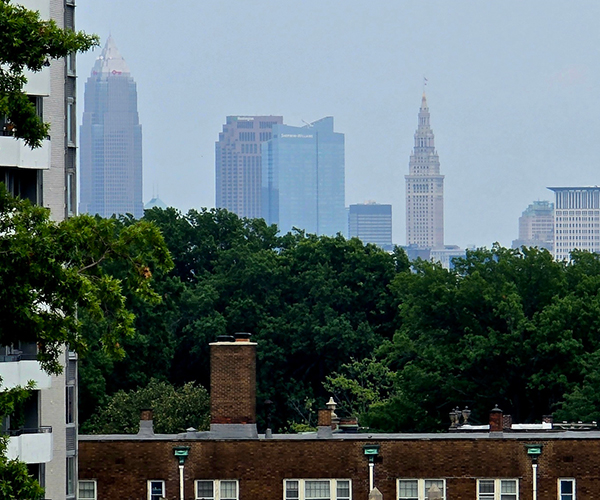There is green in going green in Cleveland.
That’s just one takeaway from Greater Cleveland Partnership’s inaugural Sustainability Summit, held the morning of Jan. 24 at the Huntington Convention Center. The event included a keynote speech from Case Western Reserve University professor Chris Laszlo and breakout business sessions with local corporate and government leaders.
Hundreds of business representatives, students, policymakers and more convened for the sold-out event. Baiju Shah, the CEO of GCP, welcomed attendees by discussing Cleveland’s potential move toward becoming a sustainability powerhouse.
“Building a great green region on a great lake is going to take all of us, working all-in, embodying our region’s seven core values: the Cleveland Way, as we call it,” says Shah. “It’s about being inspired and innovative, involved, inclusive, interconnected, working with integrity and always working in unity for the community’s benefit.”
Here are a few key takeaways from the event.
Profit and Policy
Forget virtue. Businesses are finding ways to be profitable and future-ready while making strides on sustainability.
During his keynote, Laszlo, who has written six books on sustainability, described a shift toward green practices among the entities that sit atop the S&P 500, an index used to measure the stock market, since the introduction of the S&P 500 ESG, which skews that ranking toward companies that score higher on sustainability. Since the latter was introduced in 2019, 96% of companies on the former list are reporting ESG statistics, and those with better scores seem to outperform their peers.
“This isn’t to say that if you focus on ESG, you’re going to miraculously do better than your competitors who don’t,” says Laszlo, “but does it cost? No, it doesn’t have to cost.”
In fact, many companies are simply positioning themselves for a world where vendors, supply chains, markets, government regulators and customers demand businesses are good stewards to their communities.
“Standards are rising,” Laszlo says, “and increasingly, you are going to be held to that standard.”
Biz Buzz
So what is ESG? ESG stands for environmental, social and governance performance, and an ESG score measures a business’s performance in these categories, giving shareholders a deeper understanding of a business’s community impact. In addition to tracking environmental criteria, the social and governance assessments measure factors like fair wages and healthy corporate leadership.
Though large businesses’ ESG measures don’t need to be publicly disclosed in the United States, they do, at least, need to be disclosed to investors. Last May, the U.S. Securities and Exchange Commission proposed expanding requirements for more consistent ESG reports — meaning businesses must be more transparent about their sustainability policies and frameworks. The push is meant to see past greenwashing practices that artificially balloon some businesses’ actual sustainability efforts.
So, ESG and sustainability aren’t just trends or buzzwords; they’re only going to become bigger parts of companies’ normal work.
“These mandates are not going to go away. They’re coming down fast and furiously,” says Nicole Stika, the senior business developer of sustainability solutions for World Kinect. “Sustainability at some point is not just going to be that buzzword. It’s not going to really be a unique component of a business. It’s just going to be a part of business operations.”
Lofty Goals
Zero-waste. Zero water discharge. Steep reductions in carbon emissions or, even, carbon neutrality.
Businesses both in Cleveland and around the globe have big goals for the future, whether they set their timelines at 2025, 2030 or 2050.
While many speakers at the GCP Summit outlined their companies’ specific guidelines, others put things into perspective while discussing their sustainability work.
During his keynote address, Laszlo painted a bigger picture of taking steps toward sustainability: “When a company says that it is going to reduce their CO2 emissions by 50% next year… are they doing harm, or are they making a positive impact? They are doing harm – they’re just doing harm more slowly.”
“The only way we will truly, honestly get to net-zero [emissions] is if we turn off the lights and go home,” says Lubrizol’s chief sustainability officer Elizabeth Grove. “The only product that is 100% net-zero is the one that’s never made. You are always going to generate some kind of emissions in everything you do. Our responsibility is to reduce it as much as possible and be very honest about that.”
County Work
Mike Foley, the director of the Cuyahoga County Department of Sustainability, talked less about specific business policies and more about how the region can support business, particularly when it comes to electricity. Currently, Foley says his team is crafting a microgrid system that could emphasize companies’ electrical needs.
“Electricity is not going to go away. In fact, the grid is going to become more and more stressed in the future for businesses, for residents, for consumers. As electrification of vehicles occurs, as electrification of heating occurs, there’s going to be a lot more demand on the local electrical grid that everyone is going to experience,” Foley says. “One of the things we’ve been thinking about is creating these microgrid districts where, if a larger grid goes down, we’ll be able to keep power up for local businesses, at least to start off with – industrial manufacturing spaces.”
Foley mentioned complaints his department has received from local businesses when power outages occur: product loss, equipment calibration, damages and more. The microgrid system could emphasize businesses, schools, fire departments and more — and create a more resilient power structure for their surrounding communities, says Foley.
“There’s a real cost if we don’t have a stable electric grid,” Foley says.
Building on Tradition
Despite probably having a stronger reputation for our environmental woes, Cleveland is a city with a rich history of environmental action. Of course, Cleveland spurred the Clean Water Act and the creation of the EPA when Mayor Carl Stokes testified in front of congress, urging federal involvement in our waterways, and the Cleveland Metroparks, the 100-year-old park district, created a natural gem in with the Emerald Necklace. But more recent years have seen leadership on par with the wins of the past.
Today, politicians such as Mayor Justin Bibb, a member of the national group Climate Mayors, and county executive Chris Ronayne set policy in the image of a "green city on a blue lake."
“The phrase describes a captivating vision of not only an appealing community where every one of us would want to live, but one that today represents, I think, an opportunity for us in our region, to show leadership in green technologies and green products and services,” says Shah. “This summit is about making sure that we start working together ‘all in’ to make that vision a reality.”
But while summits and conferences keep the beat on Cleveland’s environmental legacy, dollars accelerate the march of progress. Luckily, there are local companies such as Lubrizol, which is working to decrease chemical waste; Lincoln Electric, which is now making EV chargers; and Cleveland Cliffs, which is working to minimize the impact of steel-making and supply steel for sustainable infrastructure.
“We can and will be a site for sustainable growth,” says Shah. “We strongly believe that companies that embrace sustainability, embrace it not just in their business practices, but embrace it as a business opportunity will have a continued competitive advantage of regional, but also an opportunity to sell nationally and globally.”
One Last Thought
For all the summit’s talk of sustainability, the event itself might want to look inward. Single-use plastics abounded at breakfast and lunch, and even at the snack table between sessions. At least in the morning, compostable cutlery was offered, but by the time lunch rolled around, plasticware took its place. Water bottles, plasticware and coffee cups were all discarded by the event’s hundreds of attendees — little moments of hypocrisy, sprinkled between discussions about waste reduction and carbon neutrality. More sustainable practices (perhaps, water refill stations for reusable water bottles, or mugs for morning coffee, or compost bins for table scraps) might pack more of a punch at the next Sustainability Summit.
Update: According to a GCP representative, sustainable signage and compostable cutlery were used at the event, and name badges were collected at the end of the day to ensure proper recycling.
Get ahead of the weekend by signing up for our free weekly “In the CLE” newsletter — your guide to fun throughout The Land. Arriving in your inbox every Wednesday, this weekend to-do list fills you in on everything from concerts to museum exhibits — and more. Click here to subscribe.




